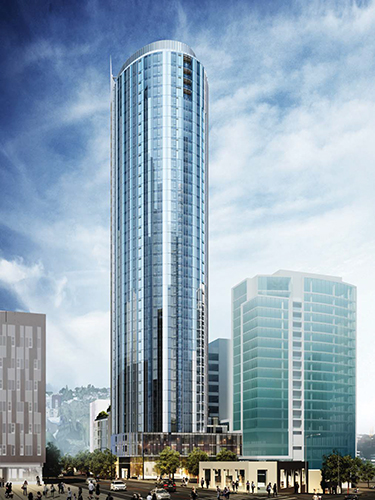|
Subscribe / Renew |
|
|
Contact Us |
|
| ► Subscribe to our Free Weekly Newsletter | |
| home | Welcome, sign in or click here to subscribe. | login |
Construction
| |
 |
May 12, 2016
Survey: Hoffman Construction Co.
Specialty: General contractor
Management: Wayne Drinkward, president and CEO
Founded: 1922
Headquarters: Portland
2015 revenues: $1.33 billion (company-wide); $788.1 million (Puget Sound region)
Projected 2016 revenues: About the same
Projects: 2202 Eighth Ave. apartment tower by Clise Properties; University of Washington NanoEngineering and Sciences Building; Washington State Ferries Colman Dock terminal upgrade
Construction and manufacturing are different industries — not the least from a safety standpoint — but Hoffman Construction Co. wouldn’t mind bridging the gap.
The company, a regional player that works in a variety of market sectors, aims for “zero accidents, zero incidents and zero waste,” said Executive Vice President Bart Eberwein.
Hoffman wants its projects to feel “a lot more like a Lexus automotive factory than an old-fashioned jobsite,” he said.
According to preliminary figures from the U.S. Bureau of Labor Statistics, the fatal work injury rate in the construction industry was 9.5 per 100,000 full-time equivalent workers in 2014 versus just 2.2 for manufacturing.
Eberwein said the focus on waste “is about safety, too, as we lean up and eliminate clutter and use off-site fabrication, just-in-time deliveries, etc.”
Paperless jobsites
That comes as technology is already transforming the industry by cutting costs and shortening project time lines.
Offices and jobsites are becoming paperless now, with “everything on little iPads and handheld devices,” Eberwein said.
Even when project team members are scattered around the country, new communication tools enable people to solve problems as they arise because “everyone is in the room together, and everyone’s looking at the same detail,” he said. “That’s a form of collaboration we did not have before.”
Hoffman broke ground last winter on a 40-story apartment for Clise Properties in Seattle’s Denny Triangle. It also saw the opening of the University of Washington light-rail station in March.
The company aims to do half its work on public projects, and half on private.
“We very consciously have a foot in both camps,” Eberwein said. “The common denominator being large, complex projects.”
Hot market sectors for Hoffman include urban housing, data centers, manufacturing, research and healthcare.
“With Obamacare, hospitals are going to be the big winners,” he said. “We’re sitting up and paying attention.”
International competition
Still, regional companies like Hoffman have their work cut out for them when they go out to compete against international firms for projects.
Eberwein said it’s a challenge “staying alive when the landscape has really large multinational competitors with headquarters in New York and overseas with real muscularity in all markets.”
Other top challenges for the company include safety, attracting young people into the field, and stretching themselves too thin.
Another challenge, Eberwein said, was “putting wealth into the communities that have been at a disadvantage.” He said the company has been working on cultivating its relationships in minority communities and nurturing small minority firms.
Plenty of graduates
While attracting construction labor can be difficult, particularly in a booming market, recruiting engineers and estimators has been easier.
“I would still say there’s not a lack of graduates that say ‘I want to build cool buildings,’” Eberwein said.
As a Portland-based company, Hoffman is also active south of the Washington border.
Asked about differences between the Seattle and Portland markets, Eberwein was hard-pressed to name many.
Both are busy, he said, with urban cores that are adding “a ton” of housing. Seattle has the stronger office market, and Portland’s office projects are more suburban.
The one big difference? Well, that’s old news: It’s Washington’s sales tax, which adds a bite to project costs.
Other Stories:
- Another looming industry shortage: leaders
- Specialty Contracting Interior
- Specialty Contracting Exterior
- Specialty Construction
- Specialty Construction Demolition
- Tenant Improvement/Renovation
- Survey: Rush Companies
- Survey: The Walsh Group
- Survey: Lease Crutcher Lewis
- Survey: Swinerton Builders
- Survey: Adolfson & Peterson Construction
- Mechanical Construction
- Mixed-Use Construction
- Industrial Construction
- 3 keys to managing on-the-job injuries
- Top 10 equipment acquisition trends for 2016
- Does your fall protection plan start at the top?
- Taming energy hogs with efficient HVAC units
- WSDOT finishing ‘The Rest of the West’ on SR 520
- IPD takes preconstruction to the next level
- Eagle of Excellence • Multifamily Construction
- Commercial Construction ($1 million to $5 million)
- Community/Public Service
- Historic Preservation/Restoration
- Survey: Skanska



